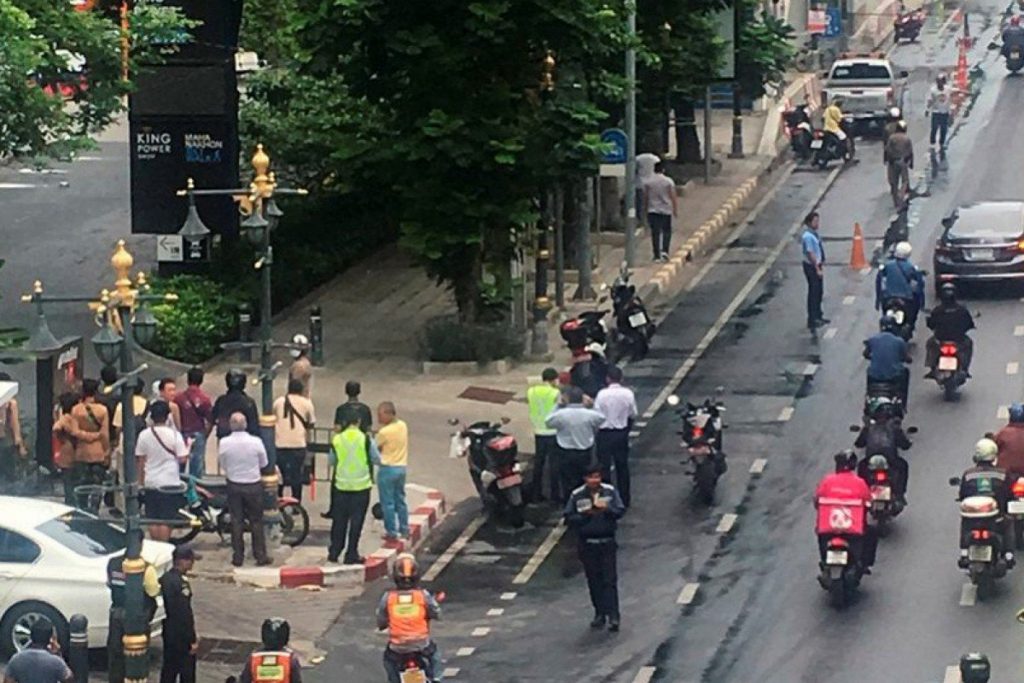Bangkok: Several small bombs exploded across Bangkok Friday, rattling the Thai capital as it hosted a regional summit attended by US Secretary of State Mike Pompeo and leaving four people wounded but not disrupting the diplomatic event.
Thailand, which has a grim history of political violence, remains deeply divided after a controversial March election returned a junta to power as a civilian government.
Prime Minister Prayut Chan-O-Cha, who led the junta, blamed the bombs on ‘ill-intended people inciting violence’ to ‘destroy peace and the country’s image’, while top Association of Southeast Asian Nation (ASEAN) diplomats and their US and Chinese counterparts are in town.
Small devices — believed to be so-called ‘ping pong bombs’ around the size of a table tennis ball — exploded at several locations across the city, none close to the summit venue.
Urging the public not to panic, Prayut said security had been tightened across the capital.
The blasts appeared to be symbolic attacks aimed at embarrassing the government during the major summit but not designed to cause mass casualties.
“Three people received slight injuries from shrapnel,” said Renu Suesattaya, director of Suanluang district where the first bombs were reported.
“I received a report that they are ‘ping pong bombs’ hidden in bushes by the road.” An emergency service hotline later said a fourth person had been hospitalised.
Two further explosions shattered glass near a well-known downtown skyscraper, emergency police added.
Bomb disposal experts were deployed around the Mahanakorn Tower — owned by the King Power group that counts Leicester City football club among its assets.
The bombings took place just before a keynote speech by America’s top diplomat Pompeo, in which he praised Thailand for rejoining the ‘democratic fold’ after five years of outright junta rule.
Thailand’s government urged the media to avoid speculation on the motive for the bombings.
“We do not know yet how many people are involved,” deputy prime minister Prawit Wongsuwon told reporters.
The blasts come weeks after former junta leader Prayut was inaugurated as a civilian prime minister, sparking outcry among many pro-democracy supporters in a kingdom scored by divisions.
The junta manoeuvred itself back into power with the help of a fully appointed senate stacked with army loyalists and an electoral system its critics say was designed to limit the success of the pro-democracy parties.
A slew of court cases since then targeting an emergent anti-military group have rankled government critics, especially younger voters.
The older ‘Red Shirt’ pro-democracy group has also reacted with outrage to the election, but has so far remained off the streets with the army seemingly in an unassailable position.
Mass protests, coups and short-lived governments have defined Thailand’s recent history, which is peppered with deadly bombings and shootings linked to politics, often by shadowy forces that are never held accountable for their crimes.
Thailand’s last hosting of ASEAN in 2009 was also overshadowed by unrest.
Then, ‘Red Shirt’ protesters smashed their way into the summit venue in the resort city of Pattaya demanding elections.
Pandemonium ensued, with a number of leaders having to be rescued from a hotel roof by Thai army helicopters while others fled by boat.
Thailand is also fighting a long-running insurgency in its Muslim-majority southernmost provinces, which occasionally spreads outside the conflict area.
Paul Chambers, a political analyst at Naresuan University, said regardless of who the perpetrators are “they are trying to delegitimise, discredit and destabilise the Thailand summit and embarrass Thailand as hosts.”
AFP
